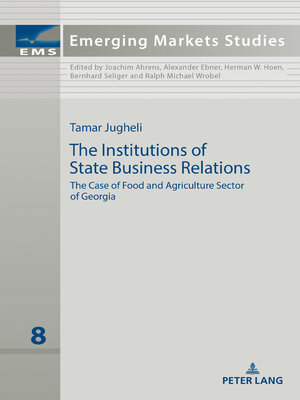The Institutions of State Business Relations
ebook ∣ The Case of Food and Agriculture Sector of Georgia · Emerging Markets Studies
By Joachim Ahrens

Sign up to save your library
With an OverDrive account, you can save your favorite libraries for at-a-glance information about availability. Find out more about OverDrive accounts.
Find this title in Libby, the library reading app by OverDrive.



Search for a digital library with this title
Title found at these libraries:
| Library Name | Distance |
|---|---|
| Loading... |
State intervention in economic activities to drive development requires specific
institutional prerequisites that maintain strategic collaboration between the
state and businesses. Arguing that the design of institutions of state business
relations is critical for successful state intervention in economic activities, this
book seeks to understand the nature of the institutions of the state-agribusiness
relations in Georgia and its functional compatibilities to the institutions
of strategic SBRs. It analyses the nature of SBRs in Georgia through the lens
of the New Institutional Economics (NIE). It employs a qualitative research
strategy for the systematic collection, organization, and interpretation of the
data. Data from 39 interviews, documents on relevant regulations and laws,
and the reports from the international organizations are triangulated to address
the research question.
institutional prerequisites that maintain strategic collaboration between the
state and businesses. Arguing that the design of institutions of state business
relations is critical for successful state intervention in economic activities, this
book seeks to understand the nature of the institutions of the state-agribusiness
relations in Georgia and its functional compatibilities to the institutions
of strategic SBRs. It analyses the nature of SBRs in Georgia through the lens
of the New Institutional Economics (NIE). It employs a qualitative research
strategy for the systematic collection, organization, and interpretation of the
data. Data from 39 interviews, documents on relevant regulations and laws,
and the reports from the international organizations are triangulated to address
the research question.







